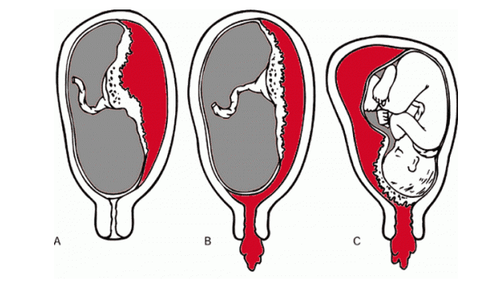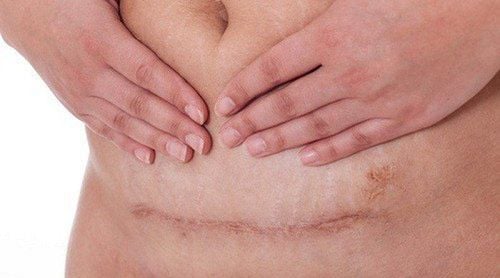This is an automatically translated article.
This article was professionally consulted by Specialist Doctor I Truong Nghia Binh - Obstetrician-Gynecologist - Department of Obstetrics and Gynecology - Vinmec Da Nang International General Hospital.In most cases, placental calcification is just an indication of the normal level of maturation of a near term fetus. However, most of the causes of excessive calcification of the placenta are due to pregnant women supplementing too much calcium-rich foods during pregnancy. Although calcium supplementation during pregnancy is necessary, excessive use will cause calcium to be deposited in the placenta.
1. What is the role of vegetable cake?
The placenta is an exchange organ between the mother and the fetus, ensuring the respiration and nourishment of the fetus. The placenta also has metabolic and endocrine activities, performing an endocrine role in pregnancy.The placenta acts like a human lung, transmitting oxygen to the fetus, protecting the fetus from the risk of aspiration of amniotic fluid; filter toxins, eliminate toxic substances that can affect the health of the fetus; transport biological wastes excreted by the fetus to the mother's circulatory system.
Vegetable cake also protects the baby from the risk of infection, protects the fetus, prevents the invasion of bacteria, toxins....
Trắc nghiệm: Bạn có hiểu đúng về dấu hiệu mang thai sớm?
Các dấu hiệu mang thai sớm không phải chỉ mỗi trễ kinh mà còn có rất nhiều dấu hiệu khác như xuất huyết âm đạo, ngực căng tức,… Điểm xem bạn biết được bao nhiêu dấu hiệu mang thai sớm thông qua bài trắc nghiệm này nhé!
2. What is calcification of vegetable cake?
Placental calcification, also known as placental calcification, involves the accumulation of calcium in the placenta. Normally, calcium accumulation increases with gestational age and when the fetus matures (≥38 weeks), placental calcification occurs.
Degree of placental calcification is divided into the following levels:
Grade 0: gestational age about 31 ± 1 week; Grade 1: gestational age 34 ± 3.2 weeks; Grade 2: gestational age 37.6 ± 2.7 weeks; Grade 3: gestational age 38.4 ± 2.2 weeks – This is the highest maturity of the placenta. When the 3rd degree placental calcification shows that the fetal lung function has begun to complete, the baby can gradually adapt and can completely live when out in the environment.
The older the gestational age, the higher the maturity of the placenta, but in each person, the expression is different, depending on each person, the process of calcification of the placenta takes place quickly or slowly.
In most cases, placental calcification is just an indication of the normal maturity of a near term fetus. However, most of the causes of excessive placental calcification are due to pregnant women supplementing too much calcium-rich foods during pregnancy.
Although calcium supplementation during pregnancy is necessary, excessive use will cause calcium to be deposited in the placenta. It can cause excess calcium in newborns, causing the fontanelle to close too soon, the jawbone is wide and protruding or the aorta is narrowed..., affecting the health of the child.
If the body has the following signs, pregnant women need to see a doctor because it may be a sign of calcification of the placenta:
Pregnant women often feel dry mouth; Pregnant women often feel headache and forgetfulness; Pregnant women feel that the muscles are a bit tight; Pregnant women urinate and constipated many times a day. Details of fetal development week by week, every parent should learn:
3. Effect of calcification of vegetable cake
In most cases, this calcium buildup does not affect placental function and the fetus is not affected.However, in some cases, a large accumulation of placental calcification can cause some of the following effects:
Accumulation of calcium in certain areas will cause fibrosis in that area and cause blockage of some blood vessels in the body. cake each other. If stage 3 calcification occurs from early weeks of pregnancy, it will make the transmission of nutrients from mother to baby will be poor, the fetus in the abdomen can absorb less nutrients, leading to fetal malnutrition. Postpartum pregnancies and highly calcified placenta are at higher risk of fetal distress due to severe hypoxia. These fetuses will also have a mortality rate 3 times higher than other fetuses. If it lasts until 42 weeks, placental calcification will occur even faster. Blood concentration in the placenta will decrease, making oxygen exchange difficult. This condition, if prolonged, can lead to fetal distress, fetal death during labor or death shortly after birth, or affect the development of the baby due to lack of oxygen in the brain. Therefore, for all pregnant women, whether or not they are diagnosed with calcification of the placenta, pregnant women also need to see a doctor according to the indications and appointments of the doctor. When the fetus is full term (through ultrasound assessment of amniotic fluid volume, placental calcification...) but the pregnant woman still has no signs of labor, the doctor will have indications for timely intervention to Best for mother and baby health.
4. Prevention of premature placental calcification

The abuse of calcium in some pregnant women will cause calcium to be deposited in the placenta, causing placental calcification. In addition, taking too much calcium can cause excess calcium in newborns, with the following manifestations: fontanelle closed too early, jawbone protruding and wide, aorta narrowing.
Therefore, it is necessary to properly supplement calcium according to the stages of pregnancy development:
From 0 to 12 weeks in pregnancy: Pregnant women need to provide about 50 mg of calcium/day (equivalent to 1-2 cups of milk) From 13-26 weeks in pregnancy: Pregnant women need to provide about 1200mg of calcium, should not be added later than 20 weeks. The later, the more calcium must be provided. From 27-38 weeks in pregnancy: Pregnant women need to provide enough 150-450 mg of calcium to ensure the comprehensive development of both mother and baby. After giving birth: Mothers need to pay attention to adequate calcium supplements so that the body can recover and improve the quality of breast milk for the baby. Placental calcification often occurs in the last 3 months of pregnancy, so in addition to paying attention to this phenomenon, the health of both mother and fetus during this period also needs to be closely monitored and checked. Pregnant women need:
Know the real signs of labor to get to the hospital in time, affecting the health of the fetus. Differentiate between amniotic fluid and vaginal discharge for timely treatment to avoid premature birth, fetal distress, and stillbirth. Be especially careful when bleeding in the last 3 months of pregnancy needs urgent emergency care to ensure the life of both mother and baby. Monitor the amount of amniotic fluid regularly and continuously. Monitor fetal weight in the last 3 months to assess baby's development and predict possible risks at birth. The special monitoring group is the same as the striker, and the fetal growth retardation needs to be closely monitored by the doctor and given appropriate indications. Distinguish between physiological contractions, labor contractions and mechanical pregnancy to get to the hospital in time. Maternity service package at Vinmec helps pregnant women's pregnancy become lighter and safer. During pregnancy, pregnant women will be examined by top doctors in the Obstetrics and Gynecology Department with high professional qualifications and experience, giving the best advice and treatment for the health of both mother and child. little.
Doctor Truong Nghia Binh has over 13 years of experience in the field of Obstetrics and Gynecology, has high expertise and long experience in the diagnosis and treatment of Obstetrics and Gynecology diseases.
Please dial HOTLINE for more information or register for an appointment HERE. Download MyVinmec app to make appointments faster and to manage your bookings easily.














